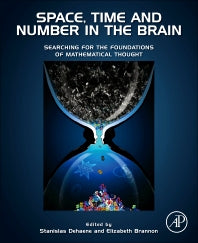Freshly Printed - allow 10 days lead
Couldn't load pickup availability
Space, Time and Number in the Brain
Searching for the Foundations of Mathematical Thought
The first interdisciplinary compilation of cutting-edge research on mathematical cognition
Stanislas Dehaene (Edited by), Elizabeth Brannon (Edited by)
9780123859488
Hardback, published 13 July 2011
374 pages
23.4 x 19 x 2.6 cm, 1.07 kg
The study of mathematical cognition and the ways in which the ideas of space, time and number are encoded in brain circuitry has become a fundamental issue for neuroscience. How such encoding differs across cultures and educational level is of further interest in education and neuropsychology. This rapidly expanding field of research is overdue for an interdisciplinary volume such as this, which deals with the neurological and psychological foundations of human numeric capacity. A uniquely integrative work, this volume provides a much needed compilation of primary source material to researchers from basic neuroscience, psychology, developmental science, neuroimaging, neuropsychology and theoretical biology.
Section I Mental Magnitudes and their Transformations 1. Mental Magnitudes 2. Objects, Sets, and Ensembles 3. Attention Mechanisms for Counting in Stabilized and in Dynamic Displays Section II Neural Codes for Space, Time and Number 4. A Manifold of Spatial Maps in the Brain 5. Temporal Neuronal Oscillations can Produce Spatial Phase Codes 6. Population Clocks 7. Discrete Neuroanatomical Substrates for Generating and Updating Temporal Expectations 8. The Neural Code for Number Section III Shared Mechanisms for Space, Time and Number? 9. Synesthesia 10. How is Number Associated with Space? The Role of Working Memory 11. Neglect “Around the Clock? 12. Saccades Compress Space, Time, and Number* Section IV Origins of Proto-Mathematical Intuitions 13. Origins of Spatial, Temporal, and Numerical Cognition 14. Evolutionary Foundations of the Approximate Number System 15. Origins and Development of Generalized Magnitude Representation Section V Representational Change and Education 16. Foundational Numerical Capacities and the Origins of Dyscalculia 17. Neurocognitive Start-Up Tools for Symbolic Number Representations 18. Natural Number and Natural Geometry 19. Geometry as a Universal Mental Construction 20. How Languages Construct Time 21. Improving Low-Income Children’s Number Sense
Subject Areas: Neurosciences [PSAN], Mathematics [PB], Cognition & cognitive psychology [JMR], Physiological & neuro-psychology, biopsychology [JMM], Experimental psychology [JML], Cognitivism, cognitive theory [JMAQ], Cognitive science [GTR]


